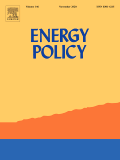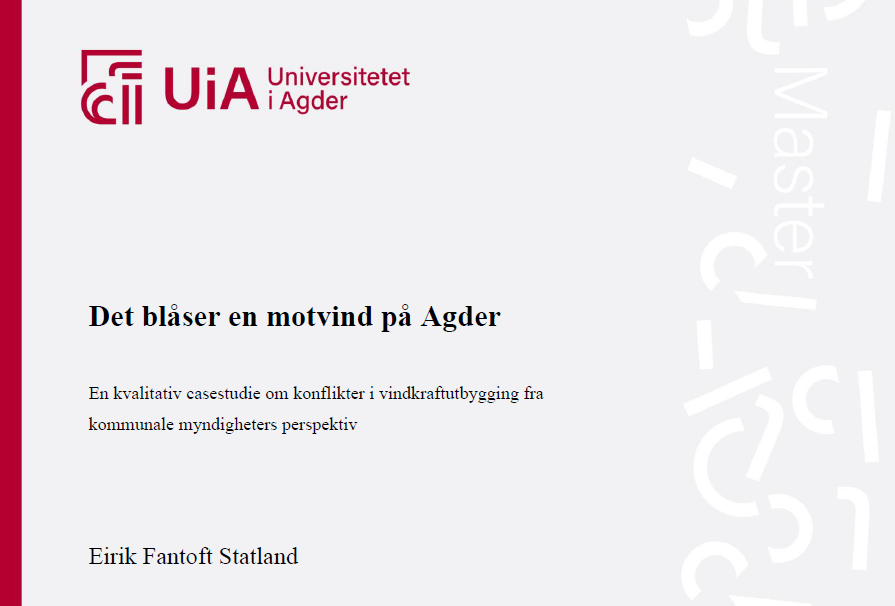What shapes Norwegian wind power policy? Analysing the constructing forces of policymaking and emerging questions of energy justice.
DOI: https://doi.org/10.1016/j.erss.2021.102089
Mikaela Vasstrøm, associate professor, Department of global development and planning, University of Agder – mikaela.vasstrom@uia.no
Hans Kjetil Lysgård, professor and vice rector for Research and interdisciplinary projects, University of Agder
Abstract: This paper employs an assemblage theoretical approach to analyse how Norwegian land-based wind power policies are constructed over time and what forces dominate and resist wind power policy development. The entanglement of policies, technology deployment and (lack of) social acceptance emphasizes the need to critically question what and who influence the construction of energy transition policies and how and what concerns are left out, especially in relation to the tenets of energy justice. We find that wind power policies are primarily influenced by energy authorities, developers and interest organizations, furthering arguments of climate concerns, energy security and economic opportunity. The emerging voices of local governments, environmental organizations and concerned citizens claim new political engagement related to valuations of (local) environmental, distributional and procedural justice and the recognition of alternative future energy imaginaries. The increase in conflicts and public debates has challenged national politicians to play a more active role in wind power policy making, which entails the reconsideration of wind power as an energy policy and critically judging what, for whom and how wind power should contribute to local, national and global energy transitions.
Drivkrefter, motkrefter og fremtidige utfordringer i norsk vindkraftpolitikk
DOI: https://doi.org/10.18261/ISSN1504-3045-2021-01-08
Mikaela Vasstrøm, associate professor, Department of global development and planning, University of Agder – mikaela.vasstrom@uia.no
Hans Kjetil Lysgård, professor and vice rector for Research and interdisciplinary projects, University of Agder
Abstract:
Det er et voksende gap mellom nasjonale myndigheters mål om økt vindkraftutbygging og motstanden på lokalt og nasjonalt nivå. De siste ti årene er det etablert nasjonale bevegelser mot vindkraftutbygging, og i flere lokalsamfunn har vindkraftutbygging skapt store protester og sivil ulydighet.
Les hele artikkelen (krever kjøp/innlogging).
Controversies of justification in Norwegian wind power policies– legitimizing “the right” concerns for climate, nature and society
Authors:
Mikaela Vasstrøm, associate professor, Department of global development and planning, University of Agder – mikaela.vasstrom@uia.no
Hans Kjetil Lysgård, professor and vice rector for Research and interdisciplinary projects, University of Agder
Abstract til et nytt conference paper av Vasstrøm and Lysgård, 2020
Basert på analyse av nasjonal politikkutvikling og den voksende nasjonale motstand mot vindkraft. I dette paper forsøker vi å finne ut hvordan argumenter for og imot vindkraft legitimeres gjennom å gi dem en høyere moralsk orden.
The Annual Meeting of the Institute of British Geographers, London, September 1-4, 2020, Session title: Moral geographies for human-environment futures
Abstract:
Global climate concerns are fueling energy transition policies at all levels across the globe. Deployment of energy transitions, however spur contestations with alternative and competing economic, socio-cultural and environmental use and value, and create disputes between different understandings of “the common good”. In Norway the public debate and conflicts on wind power development has increased over the past few years, generating a political “hot spot” of driving and countering arguments and struggle for public legitimacy. Energy landscapes are not neutral (Nadaï & Van Der Horst, 2010) and raise political and ethical questions about how (representations of) value judgements influence justice and control over space (Calvert, 2016). In a call for moral progress Smith (2000) argues that “good geography” should attend carefully to (universal) moral issues though situated analysis of particular settings, in order to “thicken” abstract theoretical concepts (Smith, 2000, p. 11).
In this paper, we build on the work of Boltanski and Thévenot (2006) on regimes of justification to analyze how (counter)arguments of wind power are situated and related to certain rationales of the common good – categorized as orders of worth.
Through national policy documents, newspaper articles, and qualitative interviews with a variety of actors at national level, we explore normative positions, framings and representations of the “right energy development” in the national wind power policy debate. We analyze how the positioning in different “orders of worth” is used to justify and develop legitimacy for certain political choices and energy development trajectories.
The paper seeks to bring theories of justification, as an analytical tool of situated moral practice, into energy policy analysis to uncover how justifications influence spatialization of energy development and reflect on how this (re)produces injustice and control of space.
Work in progress: «In a state of limbo – or motivating self-independent ways of coping with green transition issues and community development»
Authors:
Laura Tolnov Clausen, Department of Global Development and Planning, University of Agder
David Rudolph, Department of Wind Energy, Technical University of Denmark
Abstract (ongoing paper):
What happens to new projects within community-driven wind power development when political support programs suddenly cease? (i.e. the change from feed-in-tariffs to contract-for-difference = increased competition between wind communities and big developers). Do the initiatives and motivation cease or do local communities manage the change in a way that maintains the ongoing community wind development? This paper aims to look at the ways of coping with changing policies for the continuation of community wind power initiatives. It includes a discussion of whether the cessation of political support programs are seen as hampering or motivating new and more self-independent ways of coping with green transition issues and community development. On the one hand, community responses can be seen as a progressive step towards restoring communities and places that have been left behind by the state and capital. On the other hand, the question is whether the handling of the changes in practice are exemplifying empowerment or a new form of governmentality. Hence, governmentality vs. empowerment are the two main theoretical approaches that will be pursued followed in a study of the development of community wind power on the Isle of Lewis in the Outer Hebrides.
Renewable energy for sustainable rural development: Synergies
and mismatches

Authors:
Laura Tolnov Clausen, Department of Global Development and Planning, University of Agder
David Rudolph, Department of Wind Energy, Technical University of Denmark
Abstract:
Energy transition is increasingly regarded as a promising opportunity for the economic development of rural areas. This possibility is associated with the siting and (co-)ownership of decentralized (small-scale) renewable energy facilities. The underlying productive link, however, has been taken for granted, rather than conceptually and practically cultivated. Thus, while renewable energy-based rural development has been stated as a desired by-product of energy transitions, its potential has remained largely unfulfilled. This review aims to illuminate the ambiguous interplay between renewable energy and rural development in the context of the current trajectories of the energy transition. In doing so, we first examine different ways renewable energy may contribute to rural development and explore how the synergetic conflation of renewable energy and rural development has played out in Denmark and Scotland, as two countries that have forged ahead with renewable energy in rural areas.
Second, we draw on the different experiences in the two countries to critically discuss policy-related mismatches that hamper a more efficient contribution of renewable energy to rural development, and sketch out some thoughts about the need to bring rural matters and rural communities into the discussion if the synergies between energy transition and rural development are to be taken seriously.
Keywords:
Renewable energy, Rural development, Synergies, Socio-ecological fixes, Disembedding, Democracy
(Dis)Embedding the Wind – on People-Climate Reconciliation in Danish Wind Power Planning
Laura Tolnov Clausen, Department of Global Development and Planning, University of Agder
David Rudolph, Department of Wind Energy, Technical University of Denmark
Abstract:
The rationality of large scale deployment of wind energy to tackle climate change is entangled in the need for generating technological advancement, economic growth and social acceptance – the latter by supporting the reconciliation of local communities with green technologies, what we term as ‘people-climate reconciliation’. However, as challenges in practice, and a growing research in the field of ‘social acceptance’ of renewable energy have shown, the form of reconciliation at stake seems often to happen economically, spatially and democratically detached from the local host communities.
This paper argues that the understanding of people-climate reconciliation, framing modern
wind power developments, is problematic due to its underlying principles of Green Capitalism and the processes of alienation that it creates. Inspired by Polanyi’s concept of ‘dis-embedding’, i.e. the separation of economy from social relations, and Shivas’s concept of ‘living economy’, i.e. local and decentralized economy shaped by people in their everyday lives, the paper sheds light on what and who is being reconciled when deploying wind farms. Based on empirical data from a Danish case the hegemonic discourse on reconciliation framing renewable energy policies and practices of large wind farm developers is juxtaposed with a local counter-discourse. In doing so, the paper identifies
rationales underlying a community-based counter-movement. The paper argues for a reconciliation of renewables with the life of local citizens based on enhanced ‘re-embedding’ of renewable energy developments into local culture and economy thereby considering dimensions of place-identity, equality and democracy.
Keywords: Wind-energy, Discourse analysis, Green growth, Reconciliation, Alienation, Disembedding, Counter-movement
Masteroppgave: Det blåser en motvind på Agder: En kvalitativ casestudie om konflikter i vindkraftutbygging fra kommunale myndigheters perspektiv
Av: Eirik Fantoft Statland, 2020

Formålet med denne oppgaven er å undersøke hvordan vi kan forstå framvoksende konflikter i vindkraftutbygging fra kommunale myndigheters perspektiv. Gjennom materialet kommer det fram at en sterk grad av statlig styring i vindkraftplanleggingen har bidratt til å øke konfliktnivået i kommunen. Informantene beskriver en opplevelse av tvang og at lokale interesser ikke har blitt ivaretatt i NVEs forslag til nasjonal ramme. NVEs nasjonale ramme for vindkraft har hatt en svært sentral rolle i konflikten. Informantene beskriver at det var når høringen om rammen kom, at de virkelig forstod hva vindkraftutbygging ville innebære for kommunen. Rammen har bidratt til å øke konfliktnivået og endret forståelsen av hva vindkraft vil innebære for kommunen. Videre kommer det fram flere faktorer som har bidratt til vindkraftmotstanden i kommunen. En mangel på tillit, opplevd rettferdighet og medvirkning ses som sentrale påvirkningsfaktorer for motstanden. Vi kan dermed se at studien har bekreftet flere funn fra internasjonal forskning om tilsvarende konflikter. Oppgaven min kan derfor bidra med et viktig perspektiv fra lokale myndigheter i forbindelse med nasjonal vindkraftplanlegging.